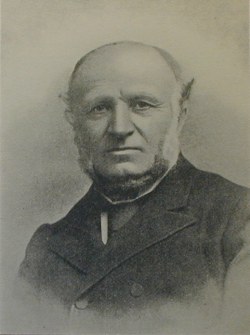 THOMAS BINNIE
THOMAS BINNIE THOMAS BINNIE
THOMAS BINNIE SON of a well-known citizen of the same name, whose life
is detailed in "One Hundred Glasgow Men," Mr. Binnie was born in 1832, and was
educated at private academies and at Glasgow High School. In 1848 he entered the
office of a firm of iron merchants, but in 1857 he joined his father, and for
twenty years was engaged in building house property in the city and suburbs, and
in the valuation of property. His father died in 1867, and from that date he
carried on the business alone till some years ago, when he assumed his son
Thomas as a partner.
About 1877 his employment as a valuator, or surveyor as it is
called in England, had so increased that he ceased building, and since then he
has been wholly occupied in the various kinds of work within the province of
valuation. The lifetime of Mr. Binnie and his father practically covers the
whole period of the industrial growth of the city. He has been personally
engaged as adviser, parliamentary witness, or arbiter (and often as all three)
in the great development of the railway systems in and around the city, in the
extension of the quays and docks on the Clyde, and in various City Improvement
and other municipal schemes. He has been the trusted adviser of great statutory
corporations and companies as well as of private investors, and he has also
acted for the Government in their land purchases in Scotland. The experience he
has had such unique opportunities of obtaining he has freely put at the disposal
of his fellow citizens, and has been specially interested in the movements for
improving the condition of the people. He was a leading witness before the
Corporation Commission on the Housing of the Poor, and he was a member of the
Government Committee on House Letting in Scotland. He is the senior trustee on
the Ferguson Bequest Fund, one of the largest educational and religious
endowments in the West of Scotland. Since 1868 he has been a member of the
Institution of Surveyors, London, and since 1899 Chairman of the Scottish
Committee of that institution.
By sympathy and early training he has taken an active part in
the ecclesiastical and religious life of the community. In 1876, as treasurer of
the Reformed Presbyterian Church, he took a considerable share in arranging the
union with the Free Church of Scotland, and he was a member of the Union
Committee of the Free Church prior to its junction with the United Presbyterian
Church in 1900. He has been actively engaged in recent years in adjusting the
difficulties which have arisen in connect on with the Church case which followed
that union. For many years his principal work, outside his professional
occupation, has been connected with Home Missions and Sabbath Schools, and
recently he acted as Treasurer of the Glasgow Free Church Extension Society, of
which his friend, Dr. Robert Howie, was the moving spirit. For some years he was
President of the Glasgow Sabbath School Union, and for more than twenty-eight
years has been engaged in work connected with the Glasgow Foundry Boys'
Religious Society. He has also been a member of executive of the Livingstonia
Mission since its constitution in 1874.
Back to
Index of Glasgow Men (1909)